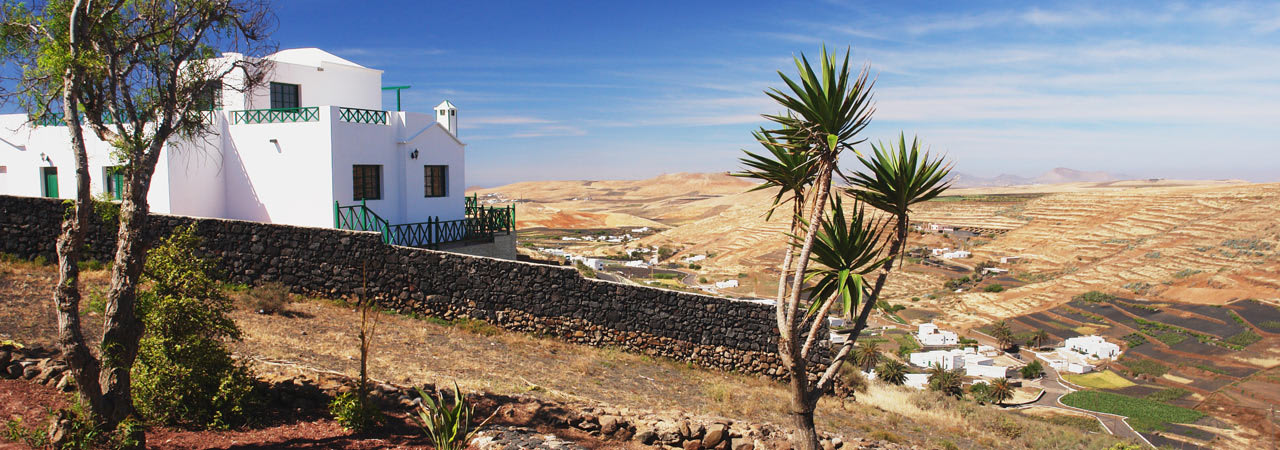Bathed in year-round sunshine, Lanzarote property can be found on this amazingly different island with its incredible moon-like landscape - barren yet starkly beautiful.
All new development is strictly monitored, keeping Lanzarote property white-washed and low-rise, using natural materials and even restricting the woodwork to two colours of paint ensuring they blend harmoniously with the surroundings.
Lanzarote's coastline is made up of long golden stretches of wide sandy beaches punctuated by little coves and bays where watersports abound. Lanzarote property can be found in many resorts such as Puerto del Carmen, Costa Teguise and Playa Blanca.
Despite its barren appearance, Lanzarote is surprisingly fertile and local crops include an abundance of figs and onions. The volcanic landscape has its own particular fascination and the careful attention to tradition and development has ensured Lanzarote retains much of its original character and culture.
Lanzarote's oldest and most popular resort is Puerto del Carmen, once a small fishing harbour, it now spreads along its wide beach of volcanic sand with a host of Lanzarote property such as villas and townhouses within an easy walk. The town has a wide selection of shops, bars and restaurants and also boasts the liveliest nightlife on the island.
A quieter resort is Playa Blanca on the southern tip of Lanzarote. Set around an attractive harbour, from which the ferry to Fuerteventura departs, it is still a relaxed and low key village with a small range of shops, cafes and restaurants. Those looking for a relaxed atmosphere would do well to consider buying Lanzarote property in Playa Blanca. There is a good sandy beach, along with some of the best beaches on the island close by including the famous Papagayo nudist beach.
Activities
Worth visiting is the Timanfaya National Park with its famous, 'Montañas del Fuego' (mountains of fire) and a huge expanse of lava fields. Admission includes a fascinating guided coach tour with the opportunity to take a camel ride up the side of a volcano and eat in the park's restaurant where all the cooking is done with natural heat from a volcano.
There are numerous water sports available - windsurfing is a particular favourite, along with diving. There is an 18 hole golf course situated in the modern, purpose built resort of Costa Teguise.
1. Putting down a Holding Deposit
On finding a property you wish to purchase you will need to negotiate the terms, price and conditions of the sale with the owner. This part of the process is not binding. We would recommend using an independent English speaking legal advisor. Once a purchase price has been agreed, normally a holding or reserve deposit will be required to ensure the property is removed from the market. The sum required will vary between properties and will be based on the purchase price. A time limit for the preagreement to be signed will be arranged and there will also be legal checks to be made.
2. Setting up a Pre-agreement (Contrato privado de compraventa)
The pre-agreement will set out the conditions under which the Buyer and Seller agree to complete the purchase of the property and the price they have agreed upon. Relevant details will generally be included for example the property details, purchase price and the date for completion. A deposit will be required at this point, this will vary, but will generally be 10% of the agreed price. This agreement will include a penal clause if the sale does not go through. If the seller pulls out of the sale your compensation will be double the deposit you have paid, but if you decide not to go through with the sale then your deposit will be lost. Certain checks will need to be made before signing the contract, checks should be made against the title of the property, mortgage status and if the property has any debts held against it. The planning status should also be looked into. These conditions can be varied by the seller and the buyer and other types of agreement can be made.
3. The Contract (Escritura de compraventa)
Before a non-Spanish purchaser can buy a Spanish property they will need to have set up a Spanish bank account and obtained a Spanish tax number (NIE). The completion will take place in the presence of a Notary Public. This is a Spanish public official, by law the deed of sale must be witnessed by a Notary Public. You will also need your own independent, expert legal advisor to act on your behalf. On Completion the buyer must pay the balance, that is the price agreed after the deposit has been deducted, plus any other fees on the completion date. Both buyer and seller must sign the Escritura de compraventa contract, (this is the Spanish equivalent of the title deeds). The title deeds (escritura) will be given to the buyer, this will be done in the presence of a Notary Public, they will certify that the transfer has taken place. The tax office will be sent a copy and the property registry will be informed of the transfer.
IMPORTANT - Disclaimer :
All information provided is believed to be current and provided free of charge. No liability can be accepted for the reliability of the information and statements made as this is obtained from 3rd parties. We always recommend you take legal advice from a fully qualified Lawyer or Notary before buying a property overseas.
Close



